Featured Story - Mother Cobb
When the fashionable young Mrs. Cobb relinquished her status as a lover of the world and became a lowly servant of Jesus Christ, she startled the inhabitants of Cazenovia, New York. But her decision was only the outward symbol of a profound and deep work of divine grace which marked the beginning of sixty long years of sacrificial and Spirit-inspired living. What chain of circumstances could so permanently have altered the entire course of one who possessed every advantage required of the world for its acceptance?
Eunice Parsons was born into a comfortable home in February, 1793, in Litchfield, Connecticut. Although her parents were not Christians, the eight children were given careful, moral training. The mother was a Universalist (somebody that believes everyone is saved); the father, apparently, had little to do with any church.
Mr. Parsons was well established in the business of tailoring and so his daughter became skillful at dressmaking. He passed away when Eunice was fourteen, and the mother moved the family to Cazonovia.
The young teenager was attractive, small, with a fair complexion, blue eyes, and wavy golden hair, which she took care to arrange in a way that called attention to her charm. Because of her beauty, she became excessively vain. 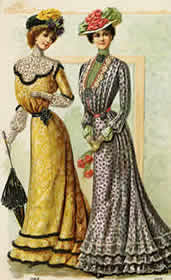 She loved to hear the swish of her silken dress as she tripped down the aisle of the church, and her clothes were fashioned in the latest style. As she walked along the street in her finery, she was exceedingly conscious of her appearance and careful that every detail of her apparel was as it ought to be. She loved to dance and took pains at all times to maintain a poise and dignity that commanded attention. Her love of fun, together with her personal attractiveness, made her the center of a merry coterie of friends.
She loved to hear the swish of her silken dress as she tripped down the aisle of the church, and her clothes were fashioned in the latest style. As she walked along the street in her finery, she was exceedingly conscious of her appearance and careful that every detail of her apparel was as it ought to be. She loved to dance and took pains at all times to maintain a poise and dignity that commanded attention. Her love of fun, together with her personal attractiveness, made her the center of a merry coterie of friends.
However, despite her fondness of the world and its pleasures, she recalled later that, “when but a little child, I felt I ought to love the Savior and get ready to live with Him in Heaven. I do not remember that I ever neglected to say my little prayer. This text had a great effect upon my feelings: 'Let this mind be in you, which was also in Christ Jesus.'”
When Eunice was twenty-four years of age, she became conscious of the emptiness of the life she was living. Though at that time her knowledge of spiritual truth was meager, she resolved to turn from the pleasures of the world. She frequented the dance no more; she laid aside superfluous adornment and became a member of the Presbyterian Church. A year later, she married Whiteman Cobb, a young man with excellent business prospects. He was not a Christian, but never neglected taking his young wife to church.
During her early married life, the Methodists, “the sect . . .everywhere spoken against,” began holding services. Their preaching dealt especially with sin and separation from the world, with a strong emphasis upon holiness of heart as essential to a stable, Christian life and entrance into Heaven as well. When Mrs. Cobb was invited to attended one evening, she excepted, not as to scoff, as some of her friends would, but to obtain help for her soul. “It was a blessed time,” she said. “I witnessed such simplicity, such ardent zeal, such humility, that I said, 'This is the true people of God,' and my heart ran right with them.”
In these services, she felt that her spiritual life was so strengthened that, the next year, she told the Presbyterian minister it was her intention to join the Methodists. He argued that whatever spark of heavenly fire she possessed ought to be used to start a flame among the Presbyterians. Her answer was that she herself needed the warmth of a great blaze.
Soon after this, a passage from the book of Hebrews, “Go on unto perfection,” rang in her ears. As she waited upon God, He revealed the state of her natural heart, with its workings of pride and love of the world. Although the young woman had adopted a plain style of dress, God showed her that, as far as she personally was concerned, the superfluities of life must be dispensed with. As she prayed, the conviction deepened that the utmost simplicity must henceforth mark her whole deportment. In later life she expressed it thus: “Perfect love dwells only in the bosom of simplicity for, according to the example of Christ and the apostles, true religion is severe in simplicity.”
Probably because the love of display had been so prominent in her life, to separate herself completely from all worldly ostentation, Mrs. Cobb resolved to follow the example of Jesus, Who “though he was rich,” yet for us “became poor.” She decided, to a great extent, to forego the use of her husband's carriage. Instead, she took to walking to her destination, thus identifying herself with the poor and humble. She would cut off her beautiful curls and wear a cap. Her dresses were to be made in blue calico.
Though the decision to adopt such a role of poverty was extremely crucifying to her pride, so intense were her longings for cleansing that she resolved to pay the price, whatever the cost. Her yearning heart was satisfied when she went alone to a nearby grove to pray. Her own words describe the conflict which ensured:
What a struggle I had with the powers of darkness! I was a long time agonizing in prayer. Then I said, “I have done everything that is in my power to do, and I will never rise from this spot till God does the work.” Now I was willing to become anything or nothing for Christ's sake.
In that moment, my prayer was answered; my struggle ceased; my unutterable longing was gratified. Instantly a power from above touched me. Jesus took entire possession . I melted as wax before the fire; praise took the place of prayer, and my full soul was dissolved in love. In a moment, I saw that this was sanctification. Oh, what a calm, what a settling down of sweet peace – perfect peace! No ecstasy, only that of astonishment at what I had just realized. It is not in the power of language to describe it. My peace flowed like a river.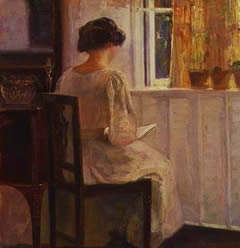
Although her path through life was humble and more or less obscure, Mrs. Cobb is outstanding in her exemplification of holiness. Her life breathed out the spirit of prayer. Early in the morning, her family would find her on her knees, with the open Bible before her, seeking divine guidance, as she tells us herself in one of her diary entries:
I arose at four this morning. How clear my mind! How great the happiness in keeping the commandments! “Those that seek me early shall find me.” I think this has reference to early in the morning, as well as early in life. It is “the willing and obedient” that eat the “good of the land.”
Have some conviction on account of indulgence in staying in bed later than usual. I wonder how I could doze when, if I arise early, I have time for all things. I never saw myself so little, yet I am kept by His almighty power.
Mrs. Cobb persuaded some of her friends to join her every Friday in fasting and prayer for people of Cazenovia. Once a year she visited personally every family in the town, praying with them and pointing them to Christ. She stretched out her hand to the needy and, when she herself had no more to give, solicited aid from those who were able to do so.
The course she followed most naturally aroused the opposition of her husband, mother, brothers, and sisters. One who had been an intimate friend passed her by on the other side of the street, not even acknowledging her presence. This hurt her deeply, and for a time the enemy of her soul cruelly taunted her.
One evening Mrs. Cobb went into her closet to pray, and her disgruntled husband turned the key, locking her in for the night. When he released her the next morning, her reaction to his unkindness was, “Good morning, I have had such a good time of prayer for you.”
Her husband, for a time, made a profession and joined her in worship with the Methodists. For some years, he served as a class leader, and then he grew cold and drifted away. In 1835, he decided to make a home for his family further west and settle successively near the cities of Laporte, Indiana, and Marengo, Illinois. By these moves, he hoped to separate his wife from those spiritual influences in Cazenovia which he blamed for her very decided religious convictions.
Eunice found life was primitive in both areas to which she moved, but “Mother Cobb,” as she came to be known, motivated by her love for souls, went from cabin to cabin, starting prayer services and speaking about the things of God to all who crossed her path. Walking sometimes for miles, this indefatigable soul-winner prayed with the bereaved, visited the sick, and warned the careless. If a fight ensued in the local bar, it quieted the men merely to suggest that Mother Cobb be called to the scene.
Her diary entries reveal how far-reaching were her extensions for the Lord:
January, 1838. Spent an hour in Chicago, conversing with a number on the importance of being prepared for death. Had a great burden for some young ladies in the public houses. Warned them faithfully and prayed for them.
Friday. Was very much blessed in visiting the criminals in jail. God gave me an unusual spirit of prayer for my sons and the precious youth of our land.
May 25th. I want that holy zeal that when I talk with the unconverted my tears will witness my sincerity. I cannot be idle and grow in grace. I must be exact in redeeming the time. I want to breathe the whole spirit of a missionary.
After thirty years of this most faithful sowing, an outpouring of the Holy Spirit attended the ministry of Dr. John Redfield throughout this area. And it was apparent to those who knew of the fervent pleadings and tireless efforts of Mother Cobb, that these had prepared the way before it to a degree which only eternity will reveal.
Dr. Redfield's ministry doubtless fulfilled her heart-breathed desire for Spirit-inspired preaching. Mother Cobb's diary discloses her longing:
I am anxious to witness the pulpit on fire, yes, the pulpit on fire! If anything in the world should be on fire, it is the pulpit. It should glow with intense heat, burning its way to the hearts of the people. The fire should wrap the Book on the sacred desk, leap along the breastwork, and make the floor hot beneath the feet of all occupants. 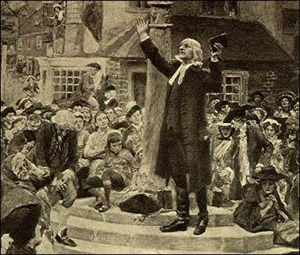
As the ambassador of Heaven stands there to deliver the Gospel message, his eyes should be eyes of flame, his tongue a fiery tongue, and his whole frame wrapped in fire – fire from the third Heaven – fire from the throne of God. Go, servant of the Lord!
Compel the dwellers by the hedges of sin and in the highways that lead down to Hell.
December 11th. Oh, for more laborers in this harvest! And we shall have them when we get this baptism of fire. Oh, the buried talents in all our churches – gifted, educated women, who would be a power for God and their generation while living; and dying, their works would follow them – who are now non-influential in the Church for the want of entire living for God. Oh, for more holy women!
We might well ask what was the secret of Mother Cobb's sixty years of such spiritual victory and blessing. It was entire dependence upon God. “I am deeply conscious,” she said, “that the root of all sin is having lost God and found self in His place. I do continually see holiness to consist in being sunk into my own nothingness, that God may be exalted in my Soul.”
In another diary entry, she asks the question:
How am I going to be kept from sin? By the constant application of the blood of Christ, moment by moment. The heart, while it lies in the cleansing blood. Claim this prize all anew, moment by moment. I claim all the purchase of Thy blood, because Thou hast promised and art faithful and just to forgive us our sins and to cleanse us from all unrighteousness.
Christ doth not say he that hath come shall never hunger, but he that cometh, indicating a continued and constant coming, a perpetual feeding upon the heavenly bread. Even the hidden manna must ever be eaten, to be ever satisfying, the soul as well as the body must take its daily bread, or it will hunger and pine. So, too, “whosoever drinketh of this water” is he that shall never thirst. Not he that has once tasted and has now forsaken the fountain of living waters is he that never thirsts. The secret of our dissatisfaction is in resting on past experience. Forgetting the things that are behind, let us come every day to Christ and receive anew His life.
Her diary entries reveal deep longings for the repeated baptisms of the Holy Ghost:
I do feel a strong desire for a greater baptism of the Holy Ghost and fire. May it descend upon the Church that we may have the gift of power! What can we do without the living presence, the holy influence? If it be not upon our altars, then we offer vain oblations, and our ceremonies, though instructive, will be lifeless.
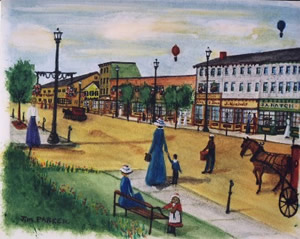 December 4th. I am before the throne, awaiting the baptism of strength to labor. Prayers, mighty, importunate, repeated, united prayers; the fathers, the children, the pastor and the people, the rich and the poor, the gifted and the simple, all uniting to cry to God that He may affect us as in the days of the right hand of the Most High and saturate us with the Spirit of Christ and warm and kindle and make us a flame of fire. Such united and repeated supplications will accomplish their end, and the power of God, descending, will make us a band of giants refreshed with new wine.
December 4th. I am before the throne, awaiting the baptism of strength to labor. Prayers, mighty, importunate, repeated, united prayers; the fathers, the children, the pastor and the people, the rich and the poor, the gifted and the simple, all uniting to cry to God that He may affect us as in the days of the right hand of the Most High and saturate us with the Spirit of Christ and warm and kindle and make us a flame of fire. Such united and repeated supplications will accomplish their end, and the power of God, descending, will make us a band of giants refreshed with new wine.
Mother Cobb had noticed earlier in her life that fasting and prayer obtained results:
For over ten years past, I have been observing the progress of religion among the Methodists, and I find that those who fast and pray most are the most spiritual (in a good way). Fasting results in quickening the power of faith. In one day, nay in one hour, the whole work may be accomplished. Lord help us!
Oh, what sweet communion I have with the blessed Spirit, not only by day but by night. I do see God in everything. I find it a great blessing to my soul to arise in the night, to pray at twelve. Prayer is just the breath of faith. To pray and not believe is to beat the air. Oh, these crosses taken up in shame and disgrace are borne at last in triumph, even in this life.
Perhaps we do not think enough of prayer – intercessory prayer – direct appeals by names for others, laying their needs – all we desire for them, out before God. We do not believe as we should. How it would help those we would serve, penetrating the heart we cannot open, shielding those we cannot speak to, comforting where our words have no power to soothe, following the steps of our beloved through the toils and perplexities of the day, lifting off their burdens with an unseen hand. At night, no ministry is so like an angel's as this silent, invisible one, known but to God. Through us, descends the blessing and, to Him alone, ascends the thanksgiving. Surely not any employment brings us so near to God as earnest, sincere prayer. There is a depth of wisdom in the words, “If only we spoke more to God for man, than even to man for God.”
The little old woman in calico went on, braving all weathers, loving all souls, praying and fasting and enjoying a communion with the Father that brought wealth beyond words. But the separated life had had its moments of pain when even her class leader, failing to understand the motive that controlled this saintly woman, said to her, “Sister Cobb, you are a disgrace to us. Your clothes are not fit to wear in a place as ours. If you would wear different clothes you would be able to grow in social status. We bear with you because of your old age.”
During her last illness, several friends called upon her and asked her, “Mother Cobb, are you about to leave us?”
“Yes, Glory!”
“Are you about to change your blue calico for a white robe?”
“Yes. Glory! Glory! Glory!
“Do you think it has all been worth it. Do you believe it was all necessary?”
“Oh yes. Glory! Hallelujah! It pays!” Within a few hours, the lips that had moved for blessing on earth were put to rest.
Take From :
"They Knew Their God" Vol. 1
By: Edwin & Lillian Harvey
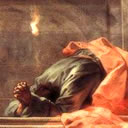 There is a voice of Truth which can be heard crying out! Whether lost or saved, we believe you will meet the living Christ through this ministry.
There is a voice of Truth which can be heard crying out! Whether lost or saved, we believe you will meet the living Christ through this ministry.